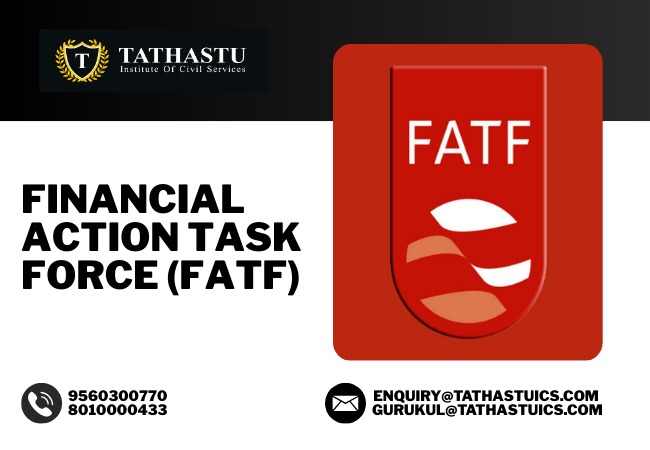What is FATF?
- The Financial Action Task Force (FATF) is an international intergovernmental body established to combat money laundering, terrorist financing, and proliferation financing (of weapons of mass destruction).
- The FATF’s primary role is to monitor, assess, and encourage countries to implement anti-money laundering (AML) and counter-terrorist financing (CFT) measures that are consistent with internationally agreed-upon norms.
Objective of FATF
The main objectives of the FATF are as follows:
- To combat money laundering (the process of disguising the illicit origins of money).
- To prevent terrorist financing (providing funds to terrorists and their organisations).
- To stop the proliferation of weapons of mass destruction (WMDs), which could be used for acts of terror or global instability.
Origin of FATF
- The FATF was established in 1989 by the G7 (Group of Seven) summit held in Paris, France.
- The primary concern at the time was the increasing use of the international financial system for money laundering.
- After the September 11 attacks in 2001, the mandate of the FATF was expanded to include measures to combat terrorist financing, reflecting the growing global concern about terrorism.
- In 2012, the FATF also added provisions to counter the financing of the proliferation of weapons of mass destruction (WMD).
Headquarters of FATF
- The headquarters of the FATF is located in Paris, France.
Members of FATF
- The organisation consists of 39 members, including major financial powers like the United States, China, India, the European Union (EU), Saudi Arabia, and more.
- India became a full member of the FATF in 2010. India is also a member of two regional FATF-style bodies:
- The Asia Pacific Group (APG) and
- The Eurasian Group on combating money laundering and terrorism financing.
Role & Functioning of FATF
The FATF Plenary is the decision-making body that meets three times per year to assess mutual evaluation reports (MER) of its member countries and decide on the course of action regarding non-compliant nations. Countries are evaluated based on:
- Effectiveness rating: This rating system measures how effective a country’s policies are and measures address money laundering and terrorist financing.
- Technical compliance: This compliance system examines the legal and institutional frameworks in place to support the country’s anti-money laundering efforts.
FATF Grey List and FATF Black List
- FATF Grey List: Countries that are under increased monitoring and have committed to addressing identified deficiencies within a given timeframe.
- Being on the Grey List is a warning, indicating that a country may face further scrutiny if issues are not addressed.
- FATF Blacklist: Countries or jurisdictions that are considered non-cooperative and have serious deficiencies in their anti-money laundering and counter-terrorist financing efforts.
- Countries on the Black List face severe international sanctions, including financial isolation and trade restrictions.
Note: As of now, countries like North Korea, Iran, and Myanmar are on the FATF blacklist.
In conclusion, the Financial Action Task Force remains a critical body in maintaining the integrity of the global financial system. It continues to evolve, addressing new challenges to ensure that financial networks are used for legitimate purposes and not exploited by criminals or terrorists. By improving transparency, expanding its reach, and strengthening international cooperation, FATF can further solidify its role in fighting financial crimes worldwide.

